#('contemplating the idea of allowing his own crucifixion'
Explore tagged Tumblr posts
Text

i have so many thoughts about his gender and how he's kind of textually a woman and/or abinary (read tags if interested)
#i dont stand for cis rust cohle. that's not real. come on...#like... super dissociated from his body and his desires. and he has to keep a tenuous hold on his identity via various forms of self control#('contemplating the idea of allowing his own crucifixion'#being sexless#being able to compartmentalize his identity to fit a need)#says himself that relationships between men and women don't work and are only fit to procreate#says his daughter's death spared him from the sin of being a father#the act of being a man or being a woman are two extremes that are too harshly defined for him#edges drawn too sharply and not allowing for any flexibility which he needs#to be a man is to be the executioner and to be a woman is to be predestined to be the martyr that is what he believes#these are choices too difficult for him to make so he leaves them unmade vague up in the air for other people to stare sneer and interrogate#and it's worse yet when his body is equal parts weapon and a stress relief mechanism to others#gets his bodily autonomy stripped so often it's second nature to him. uses barbiturates like a 50's housewife#he cleans up real fuckin' pretty— hisself and the messes he's roughly shoved into#he's tired of talking to other people like a human being— he speaks another language entirely. one more visceral and raw#one that says the truth and nothing but.#if i think about the scene in episode six with maggie and what it means—#if the two of them are women#or if one of them is something that isn't exactly a man—#i think i will lose it#rust's looser swagger (or lack thereof) in contrast to marty's prevalent machismo btw... fascinating#his kind of deer-like charm. he Looks vulnerable only he's protected by an impermeable barrier#like don't fucking touch him. you can't#rambled so MUCH. sorry. but if you understand you understand#rust cohle#true detective#disasterpiece.png
30 notes
·
View notes
Text
being in good omens fandom has made me think about biblical lore more than I used to (which still isn't a lot, to be totally honest), but when I mentally revisited Rust's infamous "I contemplate the moment in the garden...The idea of allowing your own crucifixion" quote recently I paused for a moment and pondered if we could put a queer spin on that. because in some iterations of the bible, Judas betrays Jesus and identifies him for the authorities [leading to his later crucifixion] by openly kissing him in the Garden of Gethsemane. idk if there's anything to this, it just tickled my brain. Rust identifying with Jesus giving himself over to a certain death by accepting Judas's kiss and facing his own fate. base line, it would make an excellent premise for a Rust/Marty fic where Rust knows from the beginning of an affair he starts with Marty that it will ultimately lead to his own undoing in the end. but he accepts that kiss anyway. wow
44 notes
·
View notes
Text

in this scene, rust is undercover as crash. this is a cover identity he has worked for years, developing the persona and building connections. here, he's conducting a drug deal, but really he's trying to find out where ledoux operates.
dewall doesn't trust him. but he doesn't just say that. "i can see your soul at the edges of your eyes." while this line wasn't what my original post was about, i think it's also a significant detail. where else have we seen a focus on eyes in this show?
rust's form of meditation. actually, that's what he says the crucifix is for, but the tiny mirror is right there next to it. "i contemplate the moment in the garden. the idea of allowing your own crucifixion." knowing your fate, being unable to stop it, coming to terms with it. that's kind of rust's whole perspective in a nutshell: "given how long it's taken for me to reconcile my nature, i can't figure i'd forego it on your account."
i could keep going about the theme of accepting one's nature and how that overlaps with being resistant to change, but let's stay on track here.
"[your soul is] corrosive, like acid." remember, dewall thinks he's talking to crash. the man's name is rustin. he goes by rust. as in, the chemical reaction that causes corrosion in metal. that's an incredible coincidence. but i don't think anything is a coincidence in this show.
so, dewall doesn't trust rust because he can see his soul. that's got to be a pretty unsettling thing to hear if you're undercover. but more importantly, his soul is corrosive like acid. maybe that means his true self, his soul, is so strong that it seeps through to the surface and eats away at his cover identity.


#prev thank you so much for taking an interest#i could blab about rust forever and this has been on my mind for months#true detective#rust cohle
24 notes
·
View notes
Text
“..In a sense, Mary’s attitude towards those who would not accept her ideas on religion is the central question of her whole life. She was blamed at the time, and sometimes still is, for not producing a child after she had wickedly married a ‘Spaniard’, but the real damage to her reputation comes from the burning of nearly 300 Protestants during her short reign. To being too old and increasingly ugly is added the charge that she was a religious fanatic and bigot, and in thrall to two foreign powers, Spain and Rome, which did not have the ‘true’, Protestant, interests of the English at heart. But even leaving these common stereotypes aside, a real problem remains. How did Mary come to back a campaign against individuals which led to their publicly enduring a horrible death? Mary had, after all, been known in her youth not only as beautiful to look at but also as possessed of an idealistic and ‘pure’ Christian humanist, religious nature. These ideas were strongly opposed to the religious and secular violence which was then tearing Europe apart.
At the centre of her religious life, Mary had a deep devotion to Christ both in His personal sufferings, as recorded in the Bible, and as He was present to her in the consecrated bread of the Eucharist, which she kept constantly by her as a focus for prayer and contemplation, in the form of the reserved or exposed sacrament. She fully shared the intense attachment to the saving sufferings of Jesus, in particular His trial and Crucifixion, which had been a central theme of Christian belief and practice all over western and central Europe up to and including her own lifetime. This core belief and attachment affected people who ended up on both sides of the Catholic–Protestant divide which was hardening during her reign.
There was in fact no real conflict among Europe’s rulers and religious leaders over the centrality of Christ’s sacrifice on the cross. His sufferings were described in agonizing detail in the Gospels, interpreted in the rest of the New Testament, and re-enacted in the traditional liturgies of the Church, especially during Holy Week, which had flourished in England, as elsewhere, up to Henry VIII’s reign, and which had been gradually restored when Mary became Queen. One might suppose that this form of religious devotion, together with ideas from predominantly pacifist Christian humanism with its intimate involvement in Christ’s suffering, would have led to compassion, rather than violence, in royal policy towards those who had followed Thomas Cranmer and his allies in their interpretation of the Gospel, and of what Christ did on the cross. Why was this not the case?
In recent years it has been suggested that the hermetically sealed denominational narratives – Catholic, Lutheran, Reformed, Anabaptist – of those who died for their faith in the sixteenth century need to be treated as equivalent, without ignoring or downgrading the particular religious feeling and emphasis which underlay their suffering and death. Henry VIII had over thirty English men and women, some with a Catholic and some a Protestant orientation, executed for religious offences, the former category, with the exception of Friar John Forest, being convicted of treason, and the latter burned as lapsed heretics. Mary in effect added adherents of Cranmer’s reforms to the list of potential victims, which seems to be the right word to use in this context.
In her time, religious knowledge among the general population, and not just the educated elite, whether lay or clerical, was amazingly extensive and sophisticated by twenty-first-century standards. People generally thought they knew very well how a good person should die, and what the death of a bad Christian or ‘heretic’ should be like. Yet there is ample evidence, not least from foreign ambassadors’ reports and from John Foxe’s Actes and monuments (‘Book of martyrs’), that people in the crowds which witnessed the burnings of heretics in Mary’s reign were also very sure who was a martyr and who was not, though they might differ in their views of each individual case. Words like ‘martyr’ and ‘heretic’ are slippery, though, and need to be looked at more closely
Put simply, ‘martyr’ is a version of the Greek for ‘witness’. In the first three or four Christian centuries, when followers of Jesus’s ‘Way’, as members of the Church, had been persecuted by ‘pagan’ authorities, ‘martyr’ was used to describe those brave or foolhardy individuals who died a horrible death for their faith, often in public arenas. Both concepts – witnessing for one’s faith, even to death, and the violent and cruel form of that death – had become fully part of the religious life and the procedures of the Church long before Mary’s time. ‘Heresy’, also a Greek word by origin, meant ‘choice’, but had come to mean, in the religious context, ‘wrong choice’. To it had become attached a set of unsavoury concepts involving anti-social behaviour and disease. ‘Wrong’ religion was thus an infection which had to be cauterized or cut out of the individual and of society. Those among sixteenth-century scholars who, like their medieval predecessors, engaged in the generally harmful and misleading practice of dredging for appealing texts in the Bible and taking them out of their contexts, could easily develop ideas about ‘sheep’ (Christians) who became diseased and infected the rest of the flock (the Church).
By Philip and Mary’s time, such people were commonly dealt with by an ‘Inquisition’. This word, from the Latin inquisitio, was used to mean a legal inquiry, and from the thirteenth century it began to be applied to heresy. Specalized tribunals of churchmen, with papal authority, operated in some parts of Europe, notably Spain and, from 1542, Rome, to identify and try heretics. By 1500, a complex set of laws and procedures had evolved to deal with such cases and it was accepted that although the Church itself, through its clergy and lay officers, could not shed blood, lapsed heretics, in particular, could and should be handed over to secular authorities, who would administer the death penalty, usually by means of fire. This would purge church and society of their sin and, according to the prevailing Augustinian theology, send their souls to eternal damnation, as indicated by Jesus in Matthew’s Gospel (25: 46).
Without awareness of all this, it is impossible to explain Mary’s readiness to adopt such methods in 1554–5, and persist with them until her death. In the summer of 1553, she had at least appeared to outsiders to be willing to allow the reformed services of the 1552 Book of Common Prayer to continue, if only for a time, alongside the beginnings of the restoration of Catholic worship. It is commonly understood that, to begin with, she and her closest advisers, especially Gardiner and Bonner, thought that if they took the reforming leaders out of circulation, notably Bishops Cranmer, Latimer, Ridley and Hooper, their followers would quickly return to the old faith. It soon emerged, however, that this approach would not work, and even though the kingdom was still technically in schism from Rome, the Queen and her advisers chose the traditional remedy of an Inquisition. The problem was that the old English heresy laws, which were part of statute not canon law, had been removed in the previous reign.”
- John Edwards, “Battle for England’s Soul.” in Mary I
28 notes
·
View notes
Note
ok so I'm particularly interested in
Bellamy Law
Law and Bible stuff
Law is a substitute kindergarten teacher
shichibukai applications
reverse hanahaki disease (?? do u spit out flowers when your nemesis walks by?)
if you feel like elaborating on any of these!
This is gonna get long and I actually contemplated posting them separately but would that have been more work? Yeah, that felt like more work so for anyone interested, check under the cut. :D
---------------------------------o
---------------------------------o
Bellamy Law
Hm… This would be an attempt to explore the parallels and contrasts between Bellamy and Law. I've always found it fascinating that the former was a foil to the latter.
They both come from well-off towns in the North Blue.
Bellamy left because of boredom. Law had no choice because Flevance.
Both ended up seeking Doflamingo because of his notoriety as a pirate. Both admired him initially
Doffy favored one over the other though. Bellamy always sought his approval but was never really part of the inner circle Doflamingo cared about.
Law got the dubious privilege of being part of the family despite being absent for so long. Even offered one of the highest seats by Doffy's side for seemingly nothing.
Law had no trouble turning his back on Doffy once he realized the man's nature. Bellamy tried to stick to his principles until the end despite admitting that he new he was wrong.
Bellamy can (and did) quit piracy after his ordeal with Doflamingo. Having the option to live peacefully, perhaps a return to his previous life (the one he considered boring). Law can't do that quite as easily what with his Devil fruit and his reputation.
I thought it would be interesting trying to explore what Bellamy was thinking. Did he hear the Donquixote Pirates talk about their missing 'family'? Did he get to see Doffy be amused at Law's rise as a Supernova while he kept being reminded of his own status? Did Law save Bellamy partially because he also saw what he could have been had Corazon not saved him?
On principle, Bellamy should have hated Trafalgar Law. Does. Bastard even saved him without him wanting it. But there was something about the shadows haunting those eyes and Bellamy started to wonder.
He had heard the family talk about Law before. The child personally taught by Doflamingo, chosen to be his right hand. Never was he compared to the man because Law was just obviously better. Smarter. Stronger. Bellamy was ever just an uncouth thug.
He was allowed to 'borrow' Doflamingo's symbol while Law had an empty seat waiting for his return–a seat Bellamy had wanted enough to risk everything for.
Maybe he had resented, Trafalgar Law for carelessly rejecting the things he had that Bellamy had always desired. In the end too, Trafalgar Law did prove to be better. He'd done as a child what Bellamy had trouble doing even as he was now.
But having been given the chance to observe the other man as they all recovered, he wondered, perhaps for the first time, whether despite Law being better than Bellamy, Bellamy had had it better–barring the poor life choices.
---------------------------------o
---------------------------------o
Law and Bible stuff
This is just me wanting to know how many biblical parallels and themes I can draw from Law, the Donquixote brothers, the characters associated with them, and his backstory. Honestly not sure whether this would become a fic and in what style or I'm gonna give up and just make it a post.
Not gonna elaborate on them much but here are the ideas in more bullet points (yay):
Law gets familiar with all four horsemen of the apocalypse: conquest, war, famine, and death. He even survives them.
Law is like the son in the parable of the prodigal son to the Donquixote pirates. Except the themes are inverted.
Doflamingo and Rocinante -> Cain and Abel
Ope Ope no Mi -> Granting eternal life by sacrificing one's own life
Gods descending or living among humans. Also, Homing and his family being prosecuted for other people's sins.
That scene where they were hanged by their arms outstretched looks like a crucifixion. Also, Rocinante was on the right while Doflamingo was on the left. Similar to how the penitent thief was on the right and the unrepentant one to the left.
Flevance being considered a paradise with walls/fences/gates and somewhere Law cannot return to.
In the panel where the Donquixote pirates are seated at the table, there were thirteen of them with Doffy at the center. Same as The Last Supper
There are a lot more of these (David and Goliath, Solomon, Jonah, Job, etc.) but I kinda lost the notes and some are more visual so I can't really explain it too well. This would is a drabble series to emphasize or highlight the parallels so no proper snippet for this one.
---------------------------------o
---------------------------------o
Law is a substitute kindergarten teacher
Originally an idea to get around most of the Heart Pirates being nameless but evolved to include other characters as kids. Chopper is a kindergarten teacher and he convinces Law to take over his class for a week because somehow Law has the qualifications to and free time. Naturally, he wasn't able to say no.
Unfortunately, despite not being terrible at handling children, Chopper's class is filled with menaces. Also, despite not being terrible, Law can still be awkward so...
"Mr. Trofao–fargar—"
"Trafalgar."
The kid—which one was this one again? Shit, he should really get them name plates or something—scrunched up his face and tried harder, "Tar-pal—"
"Law. Just call me Law."
"Mr. Low"—eh, close enough—"can I go to the bathroom?" Wide imploring eyes stared up at him.
"Sure, go ahead." Law gestured towards the exit of the classroom with his head.
The kid just stared expectantly at him and he tried to suppress the need to narrow his eyes.
"Is there… anything else?"
"Mr. Chopper always comes with me to hold my hand."
Really?
"Mr. Chopper isn't here. You should practice doing it on your own now." He said after a deep inhale.
"But the monsters might get me…"
"No, they won't."
"You don't know that."
"I do." Before the kid could open his mouth again to argue, he added, "Besides, children taste terrible so you're safe."
The kid looked stricken and took a step back from him. Uh oh. Glistening eyes, wobbling lower lip… "Alright! I'll go with you." The kid did not look reassured. In fact he looked like going alone with Law was the last thing he wanted to do. Guess, he kinda implied that he ate children didn't he? Oops.
Well, the kid needs to go and he's not going to be cleaning up after him if he wets himself.
Law glanced at the rest of the children. It was Arts and Craft time and they seemed preoccupied enough. Still, Law doubted Chopper ever left these kids alone–already he could see some of them glancing up at him, waiting for him to leave no doubt to cause trouble. That Monkey kid in particular looked extremely suspicious.
He stood up from his crouch and clapped twice to get everyone's attention.
"Alright. Fall in line. Single file."
There was some grumbling and questioning directed at him. "What's going on?"
Law shrugged. "You're all going to the bathroom."
---------------------------------o
---------------------------------o
Shichibukai Application Forms
Crackfic where the World Government and relevant parties review various Shichbukai Applications. Most submitted by the pirates applying themselves, some produced by their own staff. They discuss and debate. As well as judge pirate resumes.
She scanned the document. Terrible format, really. If you fail to impress within the first page, you've failed entirely. There just wasn't anyone promising enough in this batch of applications or any of the other ones before. The last one had been that clown. "Apprentice to the Pirate King," was a pretty hefty credential.
"Oh, how about this one? Three years experience pillaging, and they even listed all the towns they looted." One of the newly transferred administrative staff said.
"None of these are worth considering at all. You know, when Mihawk was asked to submit his application, he hadn't bothered with all of this. He just sent us a card with his name on it and the title "World's Strongest Swordsman," underneath."
The staff perked up. "Oh, there was an application like that." There was scramble and some shuffling before a plain white card was produced. "Here."
"'From Trafalgar Law'. What does this even mean?"
"Well, it did come with a big box..."
---------------------------------o
---------------------------------o
Reverse Hanahaki Disease
(?? do u spit out flowers when your nemesis walks by?)
Haha. At first it was going to be that way (because it is hilarious) but the inflicted would probably choke to death too soon. Or if both enemies had it, they'd end up just coughing flowers at each other until they stopped being enemies.
The version I ended up going with was that this variant of Hanahaki, instead of afflicting those with unrequited love, affected those in denial instead. The reverse part comes from the original idea that this would usually happen if you somehow fell in love with your nemesis (someone you originally hated). So it's not the thought that the other person can't love you, it's that you can't accept that you love that other person. You get cured by confessing to the person sincerely.
This is actually another KidLaw (surprise!). And the flower coughed up directly represents the person they're in love with (I went with Oda's flower representation for them because I found it funny for plot)
So the idea is that, you get sick but you don't automatically know (maybe) who it is because that's part of being in denial. Kid and Law have many enemies after all. In this story they both get it though not exactly at the same time and not known to the other.
He survived Amber Lead Syndrome only to be killed off by a stupid flower disease that apparently knows more about his own feelings than he does.
He glared at the petals. Tulips. Red.
An image of a cocky grin and a shock of red hair flashed through his mind and—nope. That's not right.
He coughed harder, tears stinging his eyes with the effort. More flowers. Now he has enough for a bouquet.
Alright, he was a doctor. He could do this. Differential time.
First, which variant does he have. He doesn't particularly feel unloved or hopeless. There wasn't anyone he wanted in particular to love him. Ok, nothing. It was maybe safe to say he had that other variant.
Which was stupid because Law had many enemies and he hated all of them.
And cue the racking coughs. More red. He was very familiar with that particular shade.
New theory. This was a new variant that somehow makes you sick when you think of the person you hated the most.
Yes, that had to be it. He thought as he all but collapsed on the floor from the sudden paroxysm.
I knew this was gonna get long. :) Oh well...
Thank you for playing. :D
#One Piece#One piece fanfiction#wip game#trafalgar law#donquixote brothers#donquixote doflamingo#donquixote roci#donquixote homing#donquixote pirates#one piece bellamy#bellamy the hyena#eustass kid#kidlaw#trafalgar d water law
49 notes
·
View notes
Photo
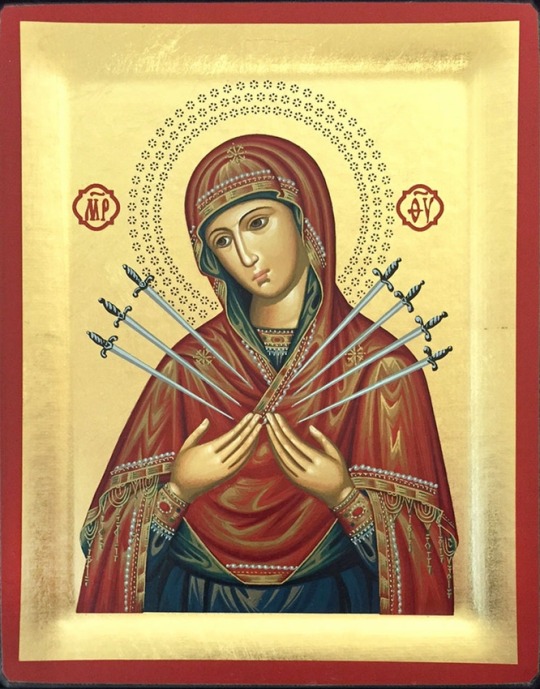
September 15 - Today is the feast day of Our Lady of Sorrows. Ora pro nobis.
Stabat mater dolorosa iuxta crucem lacrimosa, dum pendebat filius.
(At the cross her station keeping, stood the mournful mother weeping, close to Jesus to the last.) Jacopone da Todi (1230-1306)
We pray today to Our Blessed Mother, that through our joining with her sorrows, we may find the joy of eternal salvation with Jesus Christ, Our Lord. We look to Mary as a model of forbearance and endurance, obedience and meekness, love, patience, and joyful suffering.
OUR LADY OF SORROWS Fr. Francis Cuthbert Doyle, 1896
I. One of the Wise Man's most pathetic exhortations is, that a son should never forget the travailing and the sorrows of his mother. In order, therefore, that we may bear in mind the bitter anguish which lacerated our Lady's heart, we must reflect today upon that scene of woe in which her seven-fold sorrow culminated, in which the waters rose up around her, and closed over her head in a sea of anguish, such as never before flooded the heart of mortal man.
Jesus hung on the Cross, the outcast of His nation–a mark at which the vile rabble, and their still viler leaders, hurled their bitter taunts, and aimed their clumsy scorn. A galling wreath of thorns circled His head; His eyes were filled with blood; His hands and feet nailed tightly down to the cruel wood. The wickedness of a sinful world pressed heavily upon Him, and its ponderous weight well-nigh crushed Him Who upholds the universe. During His death agony, men scoffed and jeered at Him, taunting Him with impotence, and blaspheming Him most vilely; and all the while there stood by that death-bed of shame, Mary His Mother! He was Her Child; her blood flowed in His veins; her heart beat in unison with His. Those sacred features, now so sadly bruised and disfigured, were the exact counterpart of her own. That head, now crowned with thorns, had often nestled in her bosom. That tongue which now and then spoke through the darkness, had been taught by her to lisp its first accents. Between Him and her there had passed all that interchange of fond affection and tender love which takes place between a mother and the child of her bosom. Add to this the intense love with which she loved Him as her God, and we may truly say, there never could be love between mortal man and God greater than the love which existed between Jesus and Mary.
If, then, the natural effect of love is union, and if the greater the love the closer the union, we may form some idea of the agony which the sufferings of Jesus caused her heart. The thorns which made His temples throb with acute pain were as a circle of fire upon her brow. The nails which pierced His hands and feet fastened her also to His Cross. The foul language, the revilings, the scoffings, the blasphemies uttered against Him, were as a hail of fire upon her heart. Verily she was filled with His reproaches, and the revilings of them that reproached Him fell upon her. To what shall we compare her, or to what shall we liken the sorrow of this Virgin daughter of Sion? It is great as the sea. Who shall heal it? ‘O! all you that pass by the way, attend and see if there be sorrow like unto her sorrow.'
II. As we look at that ocean of sorrow, the bitter waters of which inundate her soul, we are forced to acknowledge that human words are but faint and inadequate symbols by which to indicate its depth and its breadth. Yet, though we may not be able to do this, we may at least turn our eyes with compassionate tenderness upon her, as she stands beneath the Cross, to see how she bears herself under its crushing weight, that so we also may learn how to suffer.
There are some to whom misfortune deals a blow so terrific that they are stunned and dazed by it. The insensibility which its violence produces, shields them from feeling the poignancy of the pain. It was not so with Mary. Though the magnitude of her grief surpassed all other human sorrows, yet she did not allow it so to master her as to make her swoon away, and thus be unable to feel the keenness of the sword which wounded and tortured her. Her grief, being calm and self-possessed, was on that very account all the more terrible, all the more bitter, because her mind fully adverted to all the circumstances which aggravated and brought it home more closely to her heart. Not one circumstance of those three cruel hours, during which the Saviour of the world slowly died before her eyes upon His Cross of shame, escaped her notice. Her chalice was indeed a deep and bitter one, but she drained it to the very dregs. She stood beneath that Cross!
Yet she was neither hard nor insensible. She sighed and wept, and would not be comforted; but her grief did not overwhelm her. Strong men had fled away from that spectacle. Some had turned away their eyes, that they might not witness the terrible anguish which that mutilated Victim endured. But Mary stood by Him to the end, and her tearful eyes looked up into His pallid face as it sank in death upon His breast.
O broken-hearted Mother! by the grief which then wrung thy maternal heart, by the fidelity which made thee stand by the Cross of Jesus, and bravely associate thyself with Him in His hour of ignominy and of pain, pray for us to God, that our hearts may be torn with true contrition for our sins. Mayest thou stand by us in the last hour of our life, and give us courage to pass through the portals of death to the feet of Our Judge.
III. From the sorrows of the most holy Mother of God, learn that all sorrow is the effect of sin. The first tears that ever dropped from the eyes of man were wrung from him by the bitter loss which he sustained on account of sin; and every tear that has since fallen, and gone to swell the tide of human woe, has had its origin in sin. Mary had never been guilty of sin. But sin seized upon and murdered her only Child; and therefore sin made her weep, we might almost say, tears of blood, upon the place dyed with the blood which she had given to Jesus Christ.
Look back at your life, and call to mind the numberless times in which you have sinned against your Lord. Each of these sins had its share in causing Mary's bitter tears. They helped to strike down that thorny wreath upon the brow of Jesus; to wield the cruel scourge; to dig through the delicate hands and feet; to murder Him upon the Cross. They gave nerve to the executioner's arm, and malice to the hypocritical Scribe, and words of scorn to the rabble that screamed and yelled around the Cross.
When, therefore, you contemplate the sorrows of our dearest Mother, fall upon your knees before her, look up into the face of your Saviour, smite your breast, ask pardon for having been the cause of His and of her sufferings; and promise that by resisting evil for the future, and by living a holy life, you will endeavour to blot out the evil of the past. If the merciful but just hand of God should chastise you for your sins by sending you sorrow to wring your heart with anguish, and to draw bitter tears from your eyes–Oh! lift up those eyes to the Cross on which Jesus hangs, beneath which Mary stands, and learn patiently to bear the trial. Weep with her over the work which your hands have done. Those tears are a sweet balsam to the wounds of Jesus; they are a consolation to the heart of His Mother; they are a health-giving fountain which will wash away the filth of sin, ‘and heal the stroke of its wound.'
The Seven Dolours
Different sorrows of Mary have been honored in the Church’s history, but since the 14th century these seven have commonly been regarded as the seven dolours (sorrows) of the Blessed Virgin Mary:
The prophecy of Simeon The flight into Egypt The loss of the child Jesus for three days Meeting Jesus on the way to Calvary The crucifixion and death of Jesus Jesus being taken down from the cross Jesus being laid in the tomb. Manual of Devotions Translated by Fr. Ambrose St. John , 1861
Devotion to the Sorrows of our Blessed Lady dates from Calvary. The Apostolic Church clung round her whom Jesus had given to be its Mother, and ever remembered that it was amid the pains, the Blood, and the agonies of the Passion, that it had become the child of Mary–literally “the child of her Sorrows.” The chief characteristic, then, of the Church's first love to our Lady was a deep, tender, loving, and child-like devotion to her Sorrows, and the Apostolic age bequeathed this exquisite feeling to succeeding times. But it was reserved for the thirteenth century, in many respects the grandest period in the history of religion, to develop this intuitive aflection, by giving it, as it were, a form, and uniting those most attached to this devotion in a confraternity, strongly recommended by the Church, and richly endowed with indulgences, and other favours by the Supreme Pontiffs.
It was in the year 1234. that seven holy men of Florence, retiring from that city into the cloister founded a religious Order, under the name of the Servites, or Servants of Mary, whose especial object was to honour the Sorrows of the Blessed Virgin; nor was it long before Heaven miraculously proved that our Blessed Lord, the Man of Sorrows, was well pleased with this afifectionate devotion to her who had the most nearly and bitterly shared in His Passion.
This tender sympathy, and the consequent graces richly bestowed by Jesus and Mary, were however not to be confined to the cloister. A lay affiliation of the Servites of Mary was soon established; the habit, or scapular of our Lady of Sorrows, enriched with numerous indulgences, was eagerly sought after by thousands of all ranks. The Crown or Rosary of the “Sorrows” began to emulate the Dominican Rosary; in short, the Confraternity of the “Sorrows,” like the great Society of Mount Carmel, spread through Christendom, was in like manner encouraged by holy Popes, and in like manner drew down the favours of God, and the blessings of Mary, on untold thousands of rich and poor.
The great object of this Society is to nourish a loving sympathy with our Blessed Mother in her sufferings, and with her, and through her, to unite ourselves with Jesus bleeding and dying for us.
Those who wish to practise this devotion may be divided into two classes:
1st–Those who wear the black Scapular and receive her Crown or Rosary, and join from time to time in the Offices and devotions of her Sorrows.
2nd–Those who, in addition to the above, become enrolled members of the confraternity, with a good intention of regularly observing its rules.
It is with sincere pleasure, and heartfelt gratitude, that we have seen this beautiful devotion established in this country. It has lately been regularly organized as a canonical Confraternity at St. Patrick's, Soho, London, where the first Feast of the Seven Sorrows has been solemnly kept. Of this we are certain, that in proportion as we, the Servants of Mary, compassionate her sufferings and meditate on her great Sorrows, while thus our love for her grows daily “more and more,” so also will our love for Jesus crucified still more continually increase. Private devotions will multiply, public Offices will be more regularly and more devoutly attended, and, as we confidently believe, Mary will show us a grateful love, and, with her own most marvellous blessing, will bless those who, by compassionating her Sorrows, show themselves the most truly to be her children, and give the sweetest consolation to her afilicted heart.
2 notes
·
View notes
Text
Today on Royal: Pain! :’D
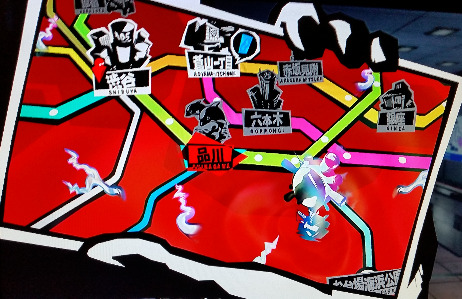
He’s eating the map and I’m getting steadily more weirded out by all of this the longer it goes on.
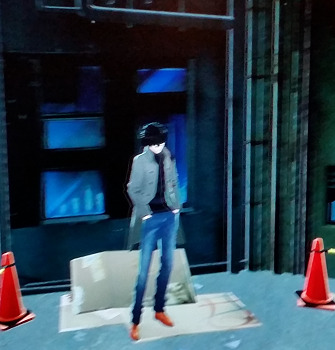
I’m definitely worried now. Where the fuck is the Velvet Room. How is he powerful enough to override the Velvet Room?
So he wants me to see “his reality”. Which means going out and seeing how happy all of Akira’s friends are. And they are happy! ...but not happy enough that a few well-placed dialogue choices can’t start poking holes in the story they’ve been fed. Maruki’s not perfect at this. And honestly, he’s taken Akira’s friends, not given him anything. We went from everyone wanting to spend time with Akira to everyone having other things to do. Ryuji doesn’t even know why they’re friends. Thinking about how they met is what starts to crack his illusion.
While I was looking for my friends, I ran across this couch outside the furniture store in Kichijoji.

Examining it yields only this:
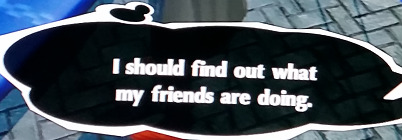
So now I gotta go back to Kichijoji after it frees me from the plot so I can see what’s up with this conspicuously Velvet blue couch.
(I will say, if I have one complaint about this part, is that it’s six days of the same thing. Wake up, locate Friend, see how they’re doing, return home, spend evening in bed contemplating whether this is a good thing because Friend is happy. You can’t do anything else, see how any of your other confidants are doing... What does Iwai’s ideal world look like? Takemi’s? Hifumi’s?)
I think out of everyone I feel the most bad for Morgana.
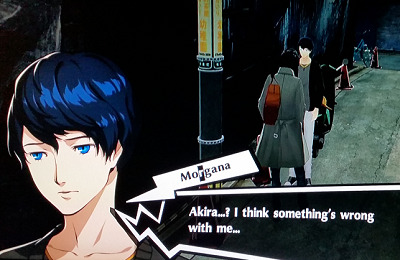
I mean, he spends half the game as it is worrying that he’s some sort of monster instead of a human. And now that he’s human and I’ve gone and jabbed a hole in his dream, he’s spending a week growing more and more afraid as he realizes that something isn’t right about himself. That’s just straight-up existential terror.
Goro didn’t really find a lot during his week of investigating. Mostly just that Maruki’s been doing cognitive psience stuff since college, and that Okumura and Wakaba are...actually alive.
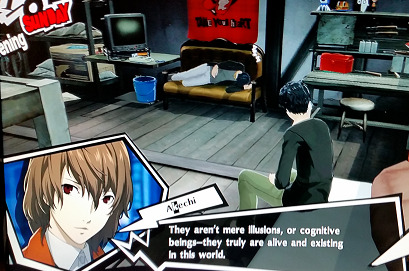
Does that mean if we end the dream, we’re murdering them?

Not taking the Misericorde with me feels like a betrayal of my role as heir to the title of Trickster, but I can’t really turn down an extra thirty points of attack. X’‘‘D Especially since Goro and I are going into the Palace alone.

Other than the weird security cameras, this place really is beautiful. And apparently the music that I like so much is called “Gentle Madman”. Stop hitting all these fucking tropes I like, Maruki. It’s not fair.
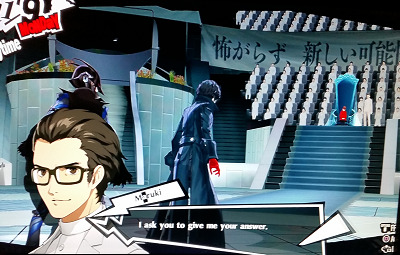
Oh heck, wait, are we doing this now? This is an actual question? I assumed that was for the endgame. Well, if I’m here... The safe room was right downstairs...
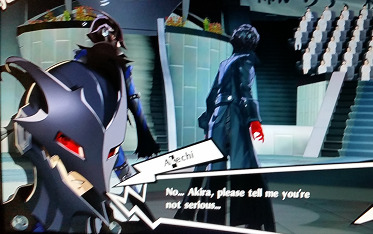
Let me be selfish. Just for one moment. Please.
Please.
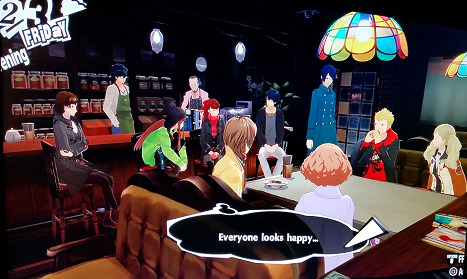
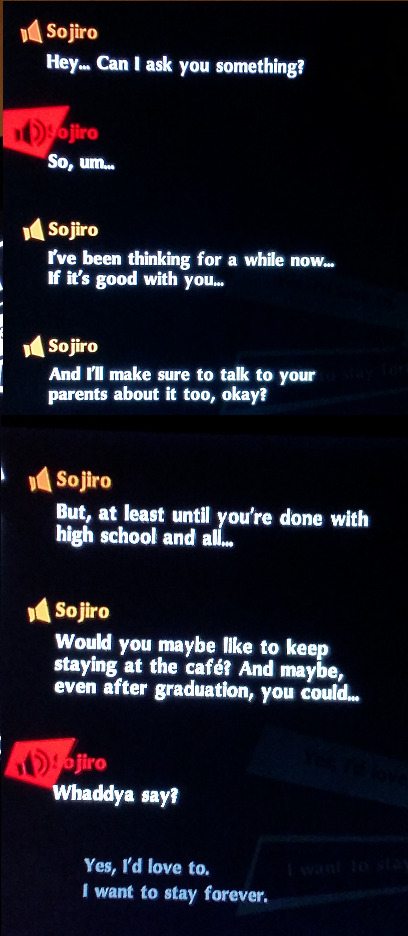
.....no, wait, this hurts.
This hurts a lot.
Because they deserve this. They all deserve this happiness. I’ve never heard Goro sound that genuinely happy as he did in this ending. But the only way to give them this is to leave them trapped under the will of a dictator. And they deserve better than that.
From the Den:

They’re looking at you. Judging you for the sin of the choice you made.
I find it interesting that while Akira and Goro are clearly looking at you with full knowledge of what you did, the game itself doesn’t seem particularly judgemental. I got the “view the ending” trophy and the option to save clear data, which to me implies that it’s...obviously the wrong choice, but a valid choice regardless. I never got the “Good” Ending in vanilla P5, so I don’t know if that offered the same level of legitimacy. This was treated as a real ending.
[reloading save data]
Of course we can’t accept this reality, why would he even think we would do that? X’‘D
Sumire is throwing a fit because she still wants to be Kasumi, and is getting ready to fight us. Shit. Still, she’s inexperienced, and both of us are strong enough to han--
Goro: I could deal with this, but I’m assuming you want her to leave here alive, right?
It’s sweet of you to take what I want into consideration, but yeah, I’d really rather not kill her, so just tone it dow-- Aaaaand he’s walking away and leaving me to fight her alone. Thanks, honey.
Shoutout to using the same strategy as the battle arena and just equipping something that repels physical. She took her own swords dance to the face and got knocked out.
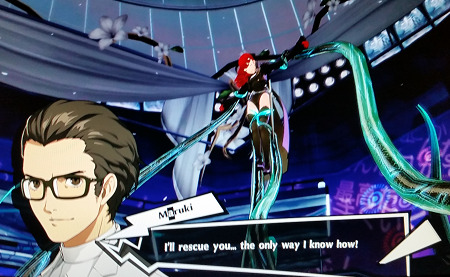
......what the fuck are you doing? This just looks like torture.
I know for a fact that that’s not Nyarlathotep because I’m pretty sure I’d have had people beating down my door to point it out already. Because crucifixion pose by itself? Common imagery. Tentacles? ...coincidence, probably. But if this had been Nyar puppeteering Maruki or something? I’m one step away from being Super Duper Valid. I already feel pretty valid anyway.
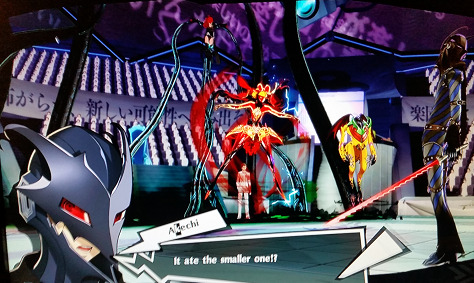
HELLO, Persona 3! Nice(?) to see an out of control persona again. I wonder how close her persona was to reverting to a shadow? Sumire feels like more of a “dungeon” sort of person. Since she’s suppressing something.
But...what was Maruki’s goal here? Beating us into submission? He’s just letting Sumire’s emotional torment go out of control; hell, he’s literally feeding into it with the Biyarkis. He’s using her to fight us, and that’s...disgusting, honestly. You want everyone to be happy, but you’re going to let her throw herself at us over and over? Really?
Why do I feel like all of this “I want you to understand, we can talk, you’ll see things my way”, all of this asking for consent, is bullshit? Does he really want us to see things his way? Or can he actually not alter our reality without consent?
Thank god for the cavalry because this battle was clearly impossible from the first round. I love that the other Thieves have no idea what the fuck is going on, but their leader is in danger so they’re gonna Fight.
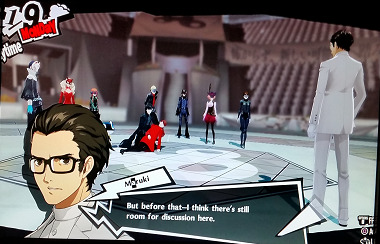
I think there’s not. We don’t want to talk. Fuck off. And also stop swiping tropes I like. You’re not Rubicante; you’re not earning my respect by refusing to fight me when I’m tired.
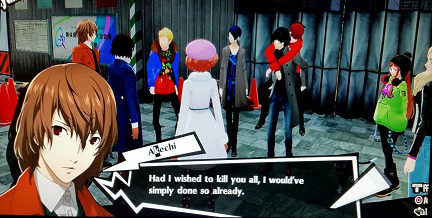
Goro, I know you’re Done with everything, but that’s really not helping.
The Phantom Thieves are momentarily baffled, because it’s clear that we have to change Maruki’s heart, but they’re getting thrown off by the fact that he’s not “evil”. Yeah, he’s not. He has good intentions. But he’s doing bad things to accomplish those intentions. Doing bad things for good reasons is still bad.
...if he wasn’t like this... maybe it would be okay. If he could make everyone happy, erase their trauma, make the world better...without rewriting memories or being a brainwashing dictator... That might not be wrong. But he’s made it pretty clear that he’s on a power trip and doesn’t want dissent, which is no better than Yaldabaoth.
What we did to Futaba and what he’s doing are vastly different things.
...Morgana calls her “Lady Lavenza” and that’s really cute, actually. I’m realizing I portray Lavenza as more of a child than the game does, but I like both.
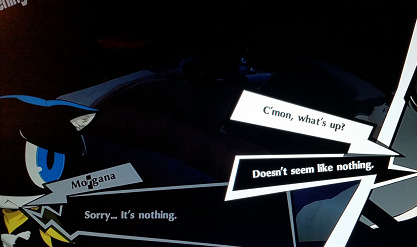
Oh so now we can press Morgana for what’s wrong. Learned from your prior mistakes, huh, ‘Kira? XD
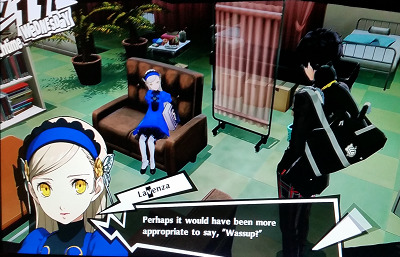
.....I love her.
It’s extremely weird to have the whole squad interacting with the Velvet attendant and addressing her by name. That’s so strange in comparison to how it usually is. But these are strange times, and once again, it’s unnerving how much power Maruki has.
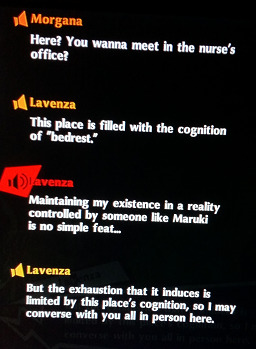
He’s strong enough that he’s suppressing the Velvet Room. That’s horrifying. I wonder if he knows they exist; I could see him considering them a threat to his ideal world. Normally I’d be sure that Igor and Lavenza could kick his ass if he tried anything, but... I genuinely don’t know anymore. Igor is still recovering from being imprisoned, and Lavenza is barely able to manifest to talk to us.
Meanwhile, Maruki is using a persona.
Normally I’d be fussed about him summoning in reality, but apparently reality is still half-fused with Mementos, which in the greater scope of Persona lore feels like something similar to what was happening in P1 and P2. The collective unconscious is very close to the surface. I’d be curious whether or not the kids could summon outside of the Palace with a bit of practice, but I’m sure the game won’t go into that.
...although, that doesn’t explain him being able to use his powers in reality before the beginning of the year. Mementos only started fusing with reality in December.
I’m looking directly at you, Atlus. You made a human villain stronger than what I imagined for the strongest persona-user?
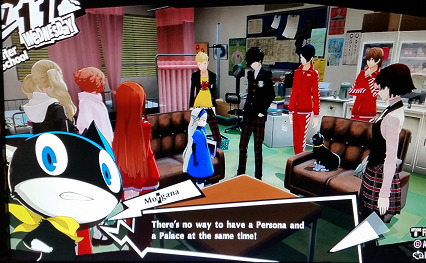
......oh, Mona, I’ve got like 3 different notes documents for you to read about why that can be allowed. X’D
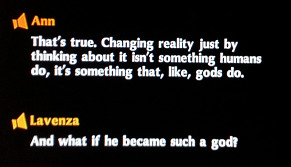
*cracks knuckles* Not to take Goro’s side, but...we already killed one god, didn’t we?
But...this is our fault, and we have to fix it. I don’t completely understand how Maruki granting the Thieves’ wishes transferred the belief of the masses to him, but... This can’t go on. If Mementos completely fuses, this becomes permanent, and there will be no way out. Time to go.
I really do appreciate that Goro was invited as one of the Phantom Thieves. And Ryuji asked for his input on whether we’re going after Maruki.
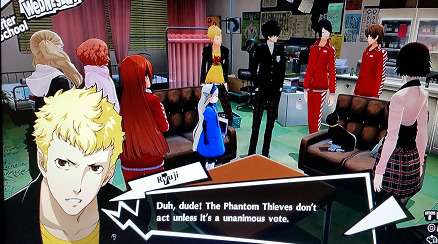
...you all said it. He’s one of you now. No take-backs.
4 notes
·
View notes
Text
True Detective Sentence Meme: Season One (another of my favorites, well, the first season at least.)
WARNING: Triggering content, NSFW content, religion/death/violence/sex/drugs/suicide mentioned. Lots of foul language
Regular Quotes
I'd consider myself a realist, alright? But in philosophical terms I'm what's called a pessimist...
Oh, just a regular type dude... with a big ass dick.
People out here, it's like they don't even know the outside world exists. Might as well be living on the fucking Moon.
It's all one ghetto man.
Stop saying shit like that. It's unprofessional.
So what's the point of getting out of bed in the morning?
I tell myself I bear witness, but the real answer is that it's obviously my programming. And I lack the constitution for suicide.
Let's make the car a place of silent reflection from now on.
Can I ask you something? You're a Christian, yeah?
I know who I am. And after all these years, there's a victory in that.
Can you get pills pretty easy?
Listen, when you're at my house, I want you to chill the fuck out.
There's nothing I can do about it. Maybe not today, maybe not tomorrow, but... I'm gonna have a drink.
Given how long its taken for me to reconcile my nature, I can't figure I'd forgo it on your account.
Hmm. That sounds God-fucking-awful.
Isn't that a beautiful way to go out, painlessly as a happy child?
Trouble with dying later is you've already grown up. The damage is done. It's too late.
I can be hard to live with. I don't mean to, but I can be... critical.
Sometimes I think I'm just not good for people, that it's not good for them to be around me.
Such holy bullshit from you. It's a woman's body, ain't it? A woman's choice.
Girls walk this Earth all the time screwin' for free. Why is it you add business to the mix and boys like you can't stand the thought? I'll tell you. It's cause suddenly you don't own it the way you thought you did.
Is shitting on any moment of decency part of your job description?
Nothing man, sorry, forget it.
You got some self loathing to do this morning, that's fine, but it ain't worth losing your hands over.
What's your deal?
I don't have "a deal".
You're kinda strange, like you might be dangerous.
Of course I'm dangerous. I'm police. I can do terrible things to people with impunity.
Now what do you mean exactly... these visions you mentioned.
Shiiiiit, just what have you two heard about me?
What the hell good is cake if you can't eat it?
You know, throughout history, I bet every old man probably said the same thing. And old men die, and the world keeps spinnin'.
What do you think the average IQ of this group is, huh?
Just observation and deduction. I see a propensity for obesity. Poverty. A yen for fairy tales.
I think it's safe to say nobody here's gonna be splitting the atom.
You see that. Your fucking attitude.
Not everybody wants to sit alone in an empty room beating off to murder manuals.
Yeah, well if the common good's gotta make up fairy tales, then it's not good for anybody.
Well, I don't use ten dollar words as much as you, but for a guy who sees no point in existence, you sure fret about it an awful lot.
I mean, can you imagine if people didn't believe, what things they'd get up to?
Exact same thing they do now. Just out in the open.
Bullshit. It'd be a fucking freak show of murder and debauchery and you know it.
If the only thing keeping a person decent is the expectation of divine reward, then brother that person is a piece of shit; and I'd like to get as many of them out in the open as possible.
Well, I guess your judgment is infallible, piece-of-shit-wise.
You figure it's all a scam, huh? All them folks? They just wrong?
People incapable of guilt usually do have a good time.
Do you wonder ever if you're a bad man?
World needs bad men. We keep the other bad men from the door.
But I think I'm all fucked up.
You don't have to fall in love at first sight, you know.
Every time I think you've hit a ceiling, you, you keep raising the bar. You're like the Michael Jordan of being a son of a bitch.
Fuuuck! Hell of a bedside manner you've got.
Ahh, you know, being stupid is different than going in sick, and this is a bar, not a fuckin' bedside.
All the dick swagger you roll, you can't spot crazy pussy?
So, enough with the self-improvement-penance-hand-wringing shit. Let's go to work.
Oh God damn it, I am so done talking to you like a man.
What the fuck you think I want with you, huh?
I'm sorry. What are you suggesting, exactly?
I will skull-fuck you, you bitch!
This is none of my business... I don't want to hear it.
Do you know the good years when you're in them, or do you just wait for them until you get ass cancer?
What always happens between men and women? Reality.
Someone once told me time is a flat circle.
The newspapers are gonna be tough on you.
No, buddy, without me... there is no you.
Yeah. Fuck this. Fuck this world.
You know, people that give me advice, I reckon they're talking to themselves.
A man's game charges a man's price. Take that away from this, if nothing else.
I'm the person least in the need of counseling in this entire fucking state.
Thought maybe we should talk.
If you get the opportunity, you should kill yourself.
Hey, man, look. Why don't you just get out of here, please? I don't want to get arrested. Just - just get... before I do something to you.
I slept with someone... And you know him/her... You're close.
Oh... Now, what-what are you saying?... What - what are you - what the fuck are you saying to me?
Life's barely long enough to get good at one thing. So be careful what you get good at.
If you were drowning, I'd throw you a fuckin' barbell.
Why would I ever help you?
Hey. You better get those jumper cables ready, the motherfucker is lying.
Get on out of here, you're classin' the place up.
My family's been here a long, long time.
He ain't gonna talk with you.
I got a car battery and two jumper cables argue different.
A man remembers his debts.
Fuck, I don't like this place... Nothing grows in the right direction.
What happened in my head is not something that gets better.
Well you know what, I just got here; I was gonna leave, but then you woke up - Jesus, what's your fuckin' problem?
Not a care in the world.
I'm not supposed to be here.
Yeah... well, I'll come back by tomorrow, buddy.
Don't ever change, man.
Agh. Ah, fuck. Ah, he got me pretty good...
Do I strike you as a talker or a doer?
You'll rip out your fucking stitches. Stop it.
This is the place.
Everybody's got a choice, ____... Shit, I sure blamed you.
There you go... Everybody's got a choice.
It's hard to find something in a man who rejects people as much as you do, you know that?
Come die with me, little priest.
The DEEP SHIT™
I think human consciousness is a tragic misstep in evolution.
There can be a burden in authority, in vigilance, like a father's burden.
I think the honorable thing for our species to do is to deny our programming. Stop reproducing, walk hand in hand into extinction - one last midnight, brothers and sisters opting out of a raw deal.
This place is like somebody's memory of a town, and the memory is fading.
I contemplate the moment in the garden; the idea of allowing your own crucifixion.
I don't sleep, I just dream.
You got kids? I think of the hubris it must take, to yank a sole out of nonexistence into this meat; a force of life into this thresher.
I know who I am. And after all these years, there's a victory in that.
Yeah, back then, the visions, yeah most of the time I was convinced... Shit... I'd lost it. But there were other times... I thought I was mainlining the secret truth of the universe.
I mean, it's like somethin's got your name on it, like a bullet or a nail in the road...
People... so goddamn frail they'd rather put a coin in the wishing well than buy dinner.
This... This is what I'm talking about. This is what I mean when I'm talkin' about time, and death, and futility.
They welcomed it... not at first, but... right there in the last instant. It's an unmistakable relief. See, cause they were afraid, and now they saw for the very first time how easy it was to just... let go.
All your life--you know, all your love, all your hate, all your memories, all your pain--it was all the same thing. It was all the same dream, a dream that you had inside a locked room, a dream about being a person.
And like a lot of dreams, there's a monster at the end of it.
You see, we all got what I call a life trap - a gene deep certainty that things will be different...
Nothing's ever fulfilled, not until the very end. And closure - nothing is ever over.
I have seen the finale of thousands of lives, man. Young, old, each one so sure of their realness. You know that their sensory experience constituted a unique individual with purpose and meaning. So certain that they were more than biological puppet. The truth wills out, and everybody sees. Once the strings are cut, all fall down.
In eternity, where there is no time, nothing can grow. Nothing can become. Nothing changes. So Death created time to grow the things that it would kill.
And you are reborn, but into the same life that you've always been born into. I mean, how many times have we had this conversation? Well, who knows?
When you can't remember your lives, you can't change your lives, and that is the terrible and the secret fate of all life. You're trapped by that nightmare you keep waking up into.
I can see your soul at the edges of your eyes. It's corrosive, like acid.
Sometimes... this feeling like life has slipped through your fingers... like the future is behind you, like it's always been behind you.
There's a shadow on you, son.
I saw you in my dream. You're in Carcosa now with me... He sees you... You'll do this again... Time is a flat circle.
There's no such thing as forgiveness. People just have short memories.
All my life I wanted to be nearer to God. But the only nearness - silence.
Some people, no matter where they look, they see themselves.
You see, sometimes people... mistake a child as an answer for something, you know, like a way to change their story.
Look, as sentient meat, however illusory our identities are, we craft those identities by making value judgments: everybody judges, all the time. Now, you got a problem with that... You're livin' wrong.
Once there was only dark. If you ask me, the light's winning.
129 notes
·
View notes
Text
KNOWING YOUR BIBLE
April 11, 2021: Dear Friends, Over the past 7 weeks, our focus has been on Lenten Season, and ending last week, with our celebration of Easter, and the resurrection of Jesus, our Lord and Savior. I encourage returning to those blogs, by going to the website above left, and, beginning with the February 21st blog, progress forward through last week’s blog, spending time contemplating on the life of Jesus, his death by crucifixion, and his resurrection.
There is a wealth of information in the listed blogs above that will increase knowledge and understanding, when striving to learn about Jesus. The more we know about Jesus, the closer and nearer we are to Jesus. In James, chapter 4, verse 8, James wrote: “Draw near to God and he will draw near to you.” The closer we are to Jesus, the more we will love him, the more we will grow to trust and have faith in him. As a result, our belief in him becomes stronger.
The discussion of this blog will be on reviewing certain ways and ideas that help in using and reading the Bible. For new followers, much of the information will be new and will be very helpful when learning the Bible. For other followers of this blog, the information provided will be a review of previous instructions that will provide refreshment to the inner thought processes, further aiding in using and reading the Bible. The topic of reviewing ways and ideas in Bible use correlates with the purpose of this blog, that is, helping one to learn and know the Bible.
Why read the Bible? What is so important in knowing the Bible? When asked these questions, most will respond that they want to learn about God. Many concur that there is a “Higher Being" over the universe, but know very little about this Being. Most refer to this “Higher Being" as “God.”
The Bible is God’s Holy Word to it’s readers so that in Bible reading, the reader learns about God, how God thinks and how God wants the reader to think and act. Thinking, contemplation, decision-making, and making choices, are all influenced by the guidance of God, that is learned through gaining knowledge of God through Bible reading and study.
First, if possible, obtain a Bible that one is comfortable to read and can be readily understood when reading. There are many versions of the Bible. The difference between versions is related to the translation of the Bible, from the original Greek or Hebrew language to a particular version of the Bible. A minister, a church teacher, a Bible store clerk, or a family member, may be helpful when choosing the version of Bible acquired. The New Revised Standard (NSR) version is used in this blog.
Second, learn the name and location of the books of the Bible. This knowledge is essential to being able to look for and read Bible verses and passages. Instructions will be given in next week’s blog on learning the books of the Bible.
Third, underline or highlight meaningful verses in the Bible so that the verses can readily be found when returning to reread and contemplate on what has been read. Make sure the Bible being highlighted is owned by the one doing the highlighting, or have an agreement with the owner to be allowed to highlight verses.
And the last idea to be listed in this blog is to find a quiet and comfortable place to sit and read the Bible so that concentration can be had of what is being read.
MAY GOD BLESS YOUR BIBLE STUDY THIS WEEK! Bible Verses to search for and read: Psalm, chapter 24, verse 1-10; chapter 91, verses 1-16. Proverbs, chapter 2, verses 1-12; chapter 4, verses 20-27; and chapter 6, verses 16-23. Jeremiah, chapter 6, verse 16; chapter 29, verses 11-14; and Jeremiah, chapter 33, verse 3. Matthew, chapters, 5, 6,and 7 (The Sermon on the Mount); and chapter 11, verses 28-30. Galatians, chapter 5, verses 16-25. Philippians, chapter 2, verses 5-11; 2nd Peter, chapter 3, verse 18
0 notes
Video
Transcript of the clip in that video below (from https://genius.com/True-detective-the-long-bright-dark-script-annotated)
EXT - BOONIES COHLE (V.O.): People out here, they don’t even know the outside world exists. INT - MARTY’S CAR COHLE: Might as well be living on the fucking moon. HART: There’s all kinds of ghettos in the world. COHLE: It’s all one ghetto, man. Giant gutter in outer space. [beat] HART: Today, that scene… That is the most fucked up thing I ever caught. Can I ask you something? You’re Christian, yeah? COHLE: No. HART: Well what do you got the cross for in your apartment? COHLE: That’s a form of meditation. Hart is knee-jerk offended at Cohle’s nonchalance about the Son of Man-- HART: How’s that? COHLE: I contemplate the moment in the garden. The idea of allowing your own crucifixion. HART: But you’re not a Christian so what do you believe? COHLE: I believe that people shouldn’t talk about this type of shit at work. HART: Hold on, hold on. Three months we been together I get nothing from you. Today, what we’re into now, do me a courtesy ok, I’m not trying to convert you. COHLE: I’d consider myself a realist, but in philosophical terms I’m what’s called a pessimist. HART: Ok, what’s that mean? COHLE: It means I’m bad at parties. HART: *laughs* let me tell you, you ain’t great outside of parties either. Hart scowls at Cohle, prodding him on. Cohle continues, relucant-- COHLE: I think human consciousness is a tragic misstep in evolution. We became too self aware. Nature created an aspect separated from itself, we are creatures that should not exist by natural law. HART: Well that sounds god-fucking-awful, Rust. COHLE: We are things that labor under the illusion that having a self. This secretion of sensory, experience, and feeling. Programmed, with total assurance, that we’re each somebody. When, in fact, everybody’s nobody. HART: I wouldn’t go around spouting that shit if I was you, people around here don’t think that way. I don’t think that way. COHLE: I think the honorable thing for our species to do is deny our programming. Stop reproducing. Walk hand-in-hand into extinction. A beat where Cohle seems almost wistful-- COHLE: One last midnight, brothers and sisters opting out of a raw deal. HART: So, what’s the point of getting out of bed in the morning? Cohle looks out the window as he speaks, almost to himself-- COHLE: I tell myself I bear witness. The real answer is that it’s obviously my programming. And I lack the constitution for suicide. HART: My luck I pick today to get to know you. Three months, I don’t hear a word from you and… COHLE: You asked. HART: Yeah. Now I’m begging you to shut the fuck up. Back to silence. As Hart grinds his teeth, Cohle stares out the windows at the ISOLATED FIELDS and RAMSHACKLE HOMES, the ELECTRICAL LINES against the DESOLATE VALLEY, BROKEN FENCES, several tense beats -- COHLE: I got a bad taste in my mouth out here. Aluminum. Ash. I can smell the psychosphere. HART: I got an idea. Let’s make the car a place of silent reflection from now on. Okay? Outside, the car passes a cheap, OLD BILLBOARD with a WOMAN’s PORTRAIT on it and the legend ‘10-11-87: DO YOU KNOW WHO KILLED ME? $10,000 REWARD. STACY GERHART - AGE 14. 337-976-5236’ COHLE: What should I bring for dinner? Horrified to be reminded of the dinner invitation, Hart re-composes himself-- HART: Bottle of wine’d be nice, I guess. COHLE: I don’t drink. This a final straw of disappointment for Hart-- HART: Well no, of course not Rust. Listen, when you’re in my house I want you to chill the fuck out. Don’t even mention any of that bullshit you just said to me. COHLE: Of course not Marty. I’m not some kind of maniac. Fuck’s sake.
youtube
would you guys say this is still the mainstream, pop culture understanding that people have of atheists or is this a relic of a past time?
11 notes
·
View notes
Photo


“I contemplate the moment in the garden; the idea of allowing your own crucifixion.”
Name: Ben Maddox
FC: Jesse Williams
Age / Birthday: 34 / 5 August 1982
Job: Lobbyist
Apartment: 204
Personality traits:
+ Passionate, Dedicated, Hardworking, Soft-Hearted
- Cynical, Stubborn, Self-Sacrificing, Conflicted
Born and raised in Denver, Colorado, Ben Maddox always longed for an escape and to see the world. He was always glued to the TV, watching the news as a teenager and often having to fight with his older siblings for it just so that he could see what was going on in other parts of the world. Between is academic and social calendar, Ben barely had time to sleep. His programs in school were advanced, doing college level work when he was a sophomore, eventually earning enough credits to graduate and enter the University of Colorado early and begin his pre-med degree. Graduating at 20 with his Bachelor’s and the need to get out of the city stronger than ever, Ben did the unthinkable according to his family and joined the Navy. After basic training he was put into intelligence and with assistance was put into accelerated medical programs to earn his Master’s and eventual PhD. Due to the US Navy covering the costs of his education and giving him unparalleled work experience in emergency medicine, with placements with Marine platoons during the war on terror, Ben decided to extend his contract a couple of years to round him out to a full ten years of service to the United States Military.
A goal Ben always had was to eventually work with the World Health Organization (WHO) or Médecins Sans Frontières (MSF) programs, MSF translates to Doctor’s Without Borders, and once he was sure that he had all the requirements, including the require UN second languages of Arabic and French, he joined MSF. He has since completed eight missions with MSF and has served in countries like Syria, Iraq, Tanzania, Congo, and the Sudan. The service with the MSF ended after four years and Ben returned home to Denver, taking a break from medicine all together. While working a tour of duty in Syria’s terror zone, helping to free and defend victims of oppression, Ben met and developed a romantic relationship with a woman whom he believed a WSO Volunteer. The relationship ended abruptly however upon finding a goodbye note with no real explanation of her sudden departure from Syria.
It had all taken too much of a toll on him. The hardships of the jobs, both serving in combat and in terror zones, effected Ben mentally and emotionally and physically. He had lost his faith in people and humanity, seen too much of what others were capable and willing to do to one another, and how many were unwilling to help those in peril. Back home in Denver and on sabbatical from medicinal practice of any kind, Ben took up the political side of the fight he’d been involved in for years, becoming a lobbyist for organizations and companies that were aiming and working to do something good for the cause and fight overseas. For those that were willing to stand up against government and work on ways to get them involved in the right ways, helping the refugees and those in desperate need of freedom from oppression.
2 notes
·
View notes
Text
02/13/2019 DAB Transcript
Exodus 35:10-36:38, Matthew 27:32-66, Psalms 34:1-10, Proverbs 9:7-8
Today is the 13th day of February. Welcome to the Daily Audio Bible. I am Brian and it is a pleasure and a joy to be here with you around the global campfire that is nice and warm and bringing light and life and good news, and we just gather around and allow God's word to speak, which is what we're about to do. We’re reading from the Contemporary English Version this week. Exodus chapter 35 verse 10 through 36 verse 38 today.
Commentary:
Okay. It’s hard to talk about anything else but what we were reading about in the book of Matthew today. And it's pretty hard to talk about that because for the first time we experienced the crucifixion of Jesus in our reading from the Scriptures this year. And, so, there’s not a whole lot else to say. And we know it's the story of our salvation but if we would just sit with the humanity of the scene. It's so heartbreaking. It is so profoundly sad to think that the Creator who fashioned beings in His own image with the idea that a mutual relationship could be formed and bound by covenant, that this creator would come and become one of us only to be killed by us. This is profoundly sad. And it doesn't feel like it's been that long ago since we began our journey but within the first couple of days of our journey we saw everything get blown apart in the book of Genesis. And in the scene that we’re seeing in the book of Matthew today we’re able to see just how far, just how twisted, just how backward an upside-down things had gotten among the human race. And to be honest, we could just look around now and say things are still pretty upside down and backward but now we don't really have an excuse because there is a way. This bloody scene that we’re seeing play out on a cross and the gasps of an innocent man, His blood was shed on our behalf and we were restored to God in the process for those of us who believe. We have no business and no excuse for living backward and upside down anymore. It's not supposed to be our reality anymore. So, if there's a thought, if there's something for us to live into today, it would be to sit with the brutal scene that is before us and what it cost to bring freedom into our lives and then to consider the ways that we’re living far less than free.
Prayer:
Jesus, thank You. And even as we say it the words fall flat because what can we say? We had no way to untangle the mess in our species created in Your image. We were irreversibly lost and then You came and rescued us and we didn't earn it and there's nothing that we can do. You’re giving it to us as a gift and so often we find ourselves not even taking the gift that cost You Your life and living into it and being transformed by it and being shaped into Your likeness. So, often we’re busy trying to make You in our image and make You do the things that we need done instead of the other way around and we’re repenting and were sitting with the starkness of the scene that the Scripture has brought into our lives today and contemplating it because there is no other story to tell. And, so, we invite Your Holy Spirit, come. Make this scene matter to us. Show us how to embrace it and show us how it is to transform us because of the work that was accomplished there, the victory that was won. Come Holy Spirit and let us sit with the weightiness of what we’ve read today and appreciate with a heart of gratitude and help us to look at the world through Your eyes. You looked at the world and loved it even though that hated You. You died for people who wanted You dead. What kind of love is that? Lead us deeper into that love we pray in Jesus’ name. Amen.
Announcements:
dailyaudiobible.com is the website, its home base, it’s where you find out what’s going on around here.
I thank you for your continued prayers over our journey to actually walk in the footsteps of Jesus and experience the land of the Bible coming up here next week.
If you want to partner with the Daily Audio Bible, you can do that at dailyaudiobible.com. There’s, of course, a link on the homepage or you can use the app, or the mailing address is PO Box 1996 Spring Hill Tennessee 37174.
And this is a community experience and if you're shouldering burdens that are too heavy and shouldn’t carry them alone then we do a good job of loving one another even though we’re spread out all over the world. There’s a number you can dial, 877-942-4253 is that number.
And that's it for today. I'm Brian I love you and I'll be waiting for you here tomorrow.
Community Prayer and Praise:
Hi, this is Amber from California. I’m a new listener and I just wanted to call in and say that the Daily Audio Bible has really blessed my life. I tend to have difficulties finding the time to sit down and just soak in the word and it’s really been an awesome experience for me to listen to Scripture and then reflect and have my own study. So, just wanted to call in and say what a blessing it was. I also wanted to share a prayer request with you all. I’ve been married for some time and have children with my husband and I’m just calling to ask our community to reach out and pray for my husband who has been struggling with a sleepwalk and really just a lot of spiritual warfare within our home and marriage and specifically with him. So, just wanted to call and ask the brothers and sisters to lift him up prayer and me up in prayer. Really trying to strive to be the mom and life that God has called me to be. So, thanks so much for listening and I look forward too much more in this community.
Hello everyone, this is Peggy in Texas. And first I want to thank Brian for doing an excellent job day after day, such a blessing to me personally. I’m calling…I’m asking for prayer for my precious grandson Xander. This is…I’ve called before, and he’s troubled, he’s alone, he’s manic-depressive, he’s drinking, he doesn’t have a doctor. So, he’s not getting any help. He hasn’t sought Christian friends. In fact, I don’t think he has one. Today he called, and he was frightened and afraid something might happen to him and afraid someone was out to cause him trouble. And I think he’s trying to reach out and say a call for help and yet I don’t know for sure. He’s in school and is working, an engineer student. So, as a grandmother I’, trying to keep the lines open to him and I’m trying to communicate love and guidance and, you know, personally I think he needs to be in a treatment center but financially that’s…that’s not possible. Anyway, you’ve got the picture. I’m a very concerned person, a very concerned grand mom. I don’t want to be a worrier, I want to trust the Lord, but I’m week. And, so…and I don’t have a great support system right now and I’m just calling on someone to pray with me. So, anyway I’m feeling a tad lonely and I just need you all too. And, so, I’m turning to you. Sometimes it’s just hard to pray. Maybe all of you have experienced that at some time but I’m in that boat tonight. And, so, I’m asking for you precious people to pray for my precious grandson, Xander. Thank you.
Hi, this is Victoria Soldier just calling. Wanted to say thank you Brian for all the fire that you’ve been putting out on the web and through your word and it’s been really blessing my soul and I just wanted to call and bless some of the other souls more abundantly. And I just wanted to pray for Prodigal and Rebecca and I wanted to pray for Hamm and Jamie and Tyler and I wanted to pray for the lady who wanted a friend and she was going through. I wanted to pray for those who have gone through depression and trying to help them to take away that precious life of the precious life through wanting to commit suicide. Lord, I just ask You to fill them with so much joy that they will see what You have before them, that the enemy is trying to take away them feeling not only the joy but knowing that they have salvation in You, knowing that they are going to be with You. Oh Lord You’re coming back soon. The world act like they don’t remember that You said You were coming back, they don’t remember that You are the way the truth and the light, but Lord You said You’re coming back __ without spot or wrinkle. You said we shall not all sleep but we shall be all changed in the moment, in the twinkling of an eye, when the sound is gonna sound and You gonna hear…and the mighty archangels…and the dead in Christ will arise first and we that are alive will be caught up to meet Him in the air. Lord I pray for my brothers and sisters today that the enemy’s trying to trick. You fill them with Your joy, You equip them with what You need to make this mighty journey. Oh Lord You bless those that need a friend, You bless those that need a spouse, You bless the one who is looking to have a baby and they couldn’t conceive but God You are…it all comes from You. Lord I just ask You to bless that womb Lord, that they will produce the baby that You have…
Hi this is Tony from Germany. I’m actually in Minnesota visiting my family and I just wanted to call in to….I’ve been listening to the Daily Audio Bible during my commute to their place…they’re in a nursing home, my parents. So, but for Tito, I want to tell you that I have tithed for many many years and I’m gonna tell you that the Lord has opened amazing doors for me and I believe that is because I tithe. For example, even going to Germany, it was just very miraculous and many many other things. And I just wanted to relay that to you because I wanted to give you a little bit of hope so you can continue onward. And then for Pelham, you know what __ ice. Not ICE but EIS, as you know, is just amazing amazing Italian ice cream. And, so I feel the Lord is steering you in the right business and perhaps at some point in time in planting a seed you will travel to Italy to learn different recipes, experiment with different recipes so one day you could do your own, come up with your own Italian ice recipe. So, remember you are not alone. I know that you’re reaching some low points. We are your family and we do love you. So, just remember that. Thanks for sharing your story with us and your faith and your faith journey. The other thing I wanted to say is I have played the Daily Audio Bible to my parents. My dad keeps his eyes closed a lot but when I have played the Daily Audio Bible his eyes open and he listens and at one point he took off his glasses, laid them down and blessed himself with this big…
0 notes
Text

Man oh man is Fellows rich. As I sit back and contemplate all we’ve learned over the past seven months I’m unsure of what’s worthy to share and what I still need to chew on. Last semester we looked into identity and relationships as well as Old Testament theology. We were broken down and challenged by who we are as Christians and as individuals. This semester we’ve been able to sit on these ideas and have allowed them to germinate. The hope being that we’d begin to see some sprouts, fitting in with our current season. As we wait for these sprouts we continue to barrel down the trail that is Fellows. I don’t think it’s much of a gamble to say that all of our paths have looked a little different. Part of my own has been venturing to figure out how we apply our theology to leadership and like John posted last week, how to do so knowing the reality of the world and the reality of who we are in it.
As I’ve trekked down this Fellows path I’ve had to go over, under, and through a lot of obstacles. Luckily I’ve had some good brothers and sisters to accompany me. Over the past couple months all of the guy fellows have been meeting regularly to discuss foreign, alien, mysterious things known to others as emotions and feelings. This exercise has brought me to a pretty big obstacle. That obstacle is the river of denial, something I have to cross if I’m to confront reality. Now this river has a lot of different forms and being raised in the Ozarks, I know my rivers all too well. Some look small, a process of minimizing and lessening the heart of an issue. Continually telling myself that “Oh the problems are not THAT bad”. Which naturally leads me to looking at other rivers or another form of denial, comparison. Comparison I believe is one that is widespread and contagious. I often compare myself with someone who I think has worse problems while in the back of my mind knowing that there will always be someone to fill that spot. Another common source of the river of denial is distraction and diversion. Diversion being the shifting of a problem to someone or something else, distraction being self inflicted ignorance. So why do I bring this up?
As we sit in the midst of Holy week we’re reminded of the entire journey. The entering in of a king on Palm Sunday, the betrayal on Wednesday, the last supper on Thursday, the agony and surrender in the garden, the denial three times over, the crucifixion on Friday, and ultimately Jesus’s resurrection this Sunday. There’s a lot to unpack in the midst of Holy week but something I tend to think about every year is whether or not I would’ve denied Christ three times. We can speculate what was going through Peter’s mind when he denied Christ. We can guess and imagine what it would’ve been like to be in the hot seat or under the stress and shock that he would’ve been in. The only thing I really know for sure is that I identify with Peter. When faced with hard truth, time and time again, I run back to the comfort of minimizing, diverting, and distracting myself from reality. My inclination for comfort leads to the tendency to control. I’m prone to take flight and follow the path of least resistance also known as my will.
This week I’m reminded of what it took. What it took to save a self-interested denier like myself. An old Mississippi campus minister used to tell me that even on your best day you had to have someone die for you. Praise for the one that did. Praise for the one that gave up the comfort of his own will to surrender to the one that truly mattered. As we wrap up the remaining six weeks of the fellows program, my hope is that we’d find beauty in surrender. That we’d take regular chances in admitting we’re human, that we’re limited, and that we’re vulnerable. That alone we can never do it. As we do that, as we admit and accept our powerlessness, as we cross the river of denial to join our brothers and sisters. Peace will come. It’s a peace that only comes with surrender, a surrender that makes it possible for the work in our lives to become greater than us. It’s only that surrender that Jesus made in that garden and on that cross that makes it possible for you and I to live.
-- Trey
Pictures from the week
MPC Scavenger Hunt 2K18. Shoutout to the 1st place 9th grade girls & my 2nd place 7th grade guys! (MLK Jr. Monument)

Shooters Shoot (Cornerstone recess)

Dani bringing the word to MPC youths

Because SNOW

0 notes
Text
Watch the boat, because it might not be here tomorrow.
The Prophet criticized Mary and denied her status as the mother [or bearer] of God, or theotokos; In this way, his teachings on Christianity mirror those of Nestorius.
The Nestorian schism led to the Church of the East being transplanted into Sassanian Persia, out of which it was transmitted into Arabia via the Lakhmids.
Mecca lay on the outer fringe of the Sassanian world, and developed a new religion out of, and parallel to, the Nestorian worldview which would rise and fall with the Pax Mongolica.
The ideas associated with Ahmaddiya Islam, specifically pertaining to the crucifixion, can be derived from Nestorius’ separation of the divine and human natures of Christ, his breaking of the hypostatic bond.
Geminism is built on this foundation, but asserts that the theotokos is inherently empty, as it cannot be historically determined on a rational basis whether which, or both, of the sacred twins was god, or if they were truly brothers.
The bearer of presence is, in other words, its absence, but also its own reflection; through this paradox, we define our sacred motto, de omnibus dubitandum est.
Contemplating this irresolvable uncertainty forces the practitioner of Geminism to identify both Christ and his reflection as God and not God; through this introspective process, doubt establishes the primal transitivity through which the divine is rendered human and the human is rendered divine.
The sacred twins are given two names: Christ and Didymus. Their given names may have been Jesus, John, or Thomas, but this is not important, for what is sacred is our doubt.
Christ and Didymus represent the unbreakable bond between two mortal men: the sacred obligation of friendship, regardless of blood, or belief, takes the place of logos, which no longer speaks to man.
Geminism rejects entirely the belief in hypostasis, in all things, as to assume the existence of an underlying state of affairs without regard for material attributes would be to deny its omnipresence.
Geminism is a humanistic religion which asserts the inherent necessity of every other religion; our ultimate goal is the reconciliation of all people in the sacred obligation of friendship.
In order to accomplish this, we utilize mind before all else, exercising doubt to ascertain reality; When reality fails, we call upon the imaginative power of the artist, who sees beyond history.
In accordance with this final precept, Geminism asserts the necessity of a humanistic myth: Jesus had a twin, and between the two of them, only two men know who, if anyone, died on the cross, and who got on the boat.
Epiphanius claimed that the Nasoreans predated Christ, suggesting that Christ and Muhammed may have been identified as prophets by the same esoteric sect; alternately, their stories may have been constructed along similar lines for the benefit of a Zoroastrian elite.
Geminism rejects this innuendo. As God cannot be divided, the double incarnation must only be considered as a manifest expression of God’s will: a test of faith, a method for exposing and correcting impure doctrine, a riddle to be solved by a future prophet.
As such, Geminism transcends the Nestorian belief in two natures to accept the literal physicality of two bodies, two living beings confused with both each other and with God.
It is only by accepting the teachings of Muhammed as legitimate that the Geminist is able to confront the double incarnation as an article of faith, as to deny or otherwise refuse to recognize the administrator of a test is to resign oneself to failure.
The Geminist agrees with Mizra Ghulam Ahmad’s interpretation of the crucifixion, but must allow himself to doubt the nature of his skepticism. While rationality demands that we accept the crucifixion as a staged production, the fact of Christ’s survival gives us hope, and it is through this hope that some measure of salvation can be found.
At the same time, the Geminist must admit that no rational or historical counterfactual exists disproving the Acts of Thomas. The miracles recounted in the text may be acts of God, or of the true Messiah. If this is the case, it is possible that Christ confused himself with Didymus deliberately to evade detection by the Romans, and that the teacher known as Yuz Asaf was not Christ, but rather his twin brother.
This would, in fact, resolve the paradox suggested by the history of Christianity in Kerala, as the northern route believed to have been followed by Didymus may have been followed by either of the two heads of the same bird. Consequently, one must be willing to transfer the seat of Christ’s continuing presence on the Earth away from Rome and install it under the Throne of Thomas in Kerala.
The brilliant perfection of this manifest expression exceeds the human mind, but remains captured by the forming principle of KRSNA, whose incarnation as the gandabherunda may be suggested as an answer to or solution of the riddle.
And yet, on this account, who plays the role of Sharabha? The destroying principle is no longer manifest as doubt, as doubt is sacred. Rather, it is through the teachings of the Buddha, who swallowed Shiva whole in his chtonic form [the mushroom] and thus succeeded in sublimating his existence in the body of the dhamma.
The destroying principle is, of course, desire; the curse afflicted upon Christ by Mary Magdalene, who corrupted his divinity and rejected him for Peter.
0 notes
Photo

OUR LADY OF SORROWS September 15
Today is the feast day of Our Lady of Sorrows. Ora pro nobis.
Stabat mater dolorosa iuxta crucem lacrimosa, dum pendebat filius.
(At the cross her station keeping, stood the mournful mother weeping, close to Jesus to the last.) Jacopone da Todi (1230-1306)
We pray today to Our Blessed Mother, that through our joining with her sorrows, we may find the joy of eternal salvation with Jesus Christ, Our Lord. We look to Mary as a model of forbearance and endurance, obedience and meekness, love, patience, and joyful suffering.
OUR LADY OF SORROWS Fr. Francis Cuthbert Doyle, 1896
I. One of the Wise Man's most pathetic exhortations is, that a son should never forget the travailing and the sorrows of his mother. In order, therefore, that we may bear in mind the bitter anguish which lacerated our Lady's heart, we must reflect today upon that scene of woe in which her seven-fold sorrow culminated, in which the waters rose up around her, and closed over her head in a sea of anguish, such as never before flooded the heart of mortal man.
Jesus hung on the Cross, the outcast of His nation–a mark at which the vile rabble, and their still viler leaders, hurled their bitter taunts, and aimed their clumsy scorn. A galling wreath of thorns circled His head; His eyes were filled with blood; His hands and feet nailed tightly down to the cruel wood. The wickedness of a sinful world pressed heavily upon Him, and its ponderous weight well-nigh crushed Him Who upholds the universe. During His death agony, men scoffed and jeered at Him, taunting Him with impotence, and blaspheming Him most vilely; and all the while there stood by that death-bed of shame, Mary His Mother! He was Her Child; her blood flowed in His veins; her heart beat in unison with His. Those sacred features, now so sadly bruised and disfigured, were the exact counterpart of her own. That head, now crowned with thorns, had often nestled in her bosom. That tongue which now and then spoke through the darkness, had been taught by her to lisp its first accents. Between Him and her there had passed all that interchange of fond affection and tender love which takes place between a mother and the child of her bosom. Add to this the intense love with which she loved Him as her God, and we may truly say, there never could be love between mortal man and God greater than the love which existed between Jesus and Mary.
If, then, the natural effect of love is union, and if the greater the love the closer the union, we may form some idea of the agony which the sufferings of Jesus caused her heart. The thorns which made His temples throb with acute pain were as a circle of fire upon her brow. The nails which pierced His hands and feet fastened her also to His Cross. The foul language, the revilings, the scoffings, the blasphemies uttered against Him, were as a hail of fire upon her heart. Verily she was filled with His reproaches, and the revilings of them that reproached Him fell upon her. To what shall we compare her, or to what shall we liken the sorrow of this Virgin daughter of Sion? It is great as the sea. Who shall heal it? ‘O! all you that pass by the way, attend and see if there be sorrow like unto her sorrow.'
II. As we look at that ocean of sorrow, the bitter waters of which inundate her soul, we are forced to acknowledge that human words are but faint and inadequate symbols by which to indicate its depth and its breadth. Yet, though we may not be able to do this, we may at least turn our eyes with compassionate tenderness upon her, as she stands beneath the Cross, to see how she bears herself under its crushing weight, that so we also may learn how to suffer.
There are some to whom misfortune deals a blow so terrific that they are stunned and dazed by it. The insensibility which its violence produces, shields them from feeling the poignancy of the pain. It was not so with Mary. Though the magnitude of her grief surpassed all other human sorrows, yet she did not allow it so to master her as to make her swoon away, and thus be unable to feel the keenness of the sword which wounded and tortured her. Her grief, being calm and self-possessed, was on that very account all the more terrible, all the more bitter, because her mind fully adverted to all the circumstances which aggravated and brought it home more closely to her heart. Not one circumstance of those three cruel hours, during which the Saviour of the world slowly died before her eyes upon His Cross of shame, escaped her notice. Her chalice was indeed a deep and bitter one, but she drained it to the very dregs. She stood beneath that Cross!
Yet she was neither hard nor insensible. She sighed and wept, and would not be comforted; but her grief did not overwhelm her. Strong men had fled away from that spectacle. Some had turned away their eyes, that they might not witness the terrible anguish which that mutilated Victim endured. But Mary stood by Him to the end, and her tearful eyes looked up into His pallid face as it sank in death upon His breast.
O broken-hearted Mother! by the grief which then wrung thy maternal heart, by the fidelity which made thee stand by the Cross of Jesus, and bravely associate thyself with Him in His hour of ignominy and of pain, pray for us to God, that our hearts may be torn with true contrition for our sins. Mayest thou stand by us in the last hour of our life, and give us courage to pass through the portals of death to the feet of Our Judge.
III. From the sorrows of the most holy Mother of God, learn that all sorrow is the effect of sin. The first tears that ever dropped from the eyes of man were wrung from him by the bitter loss which he sustained on account of sin; and every tear that has since fallen, and gone to swell the tide of human woe, has had its origin in sin. Mary had never been guilty of sin. But sin seized upon and murdered her only Child; and therefore sin made her weep, we might almost say, tears of blood, upon the place dyed with the blood which she had given to Jesus Christ.
Look back at your life, and call to mind the numberless times in which you have sinned against your Lord. Each of these sins had its share in causing Mary's bitter tears. They helped to strike down that thorny wreath upon the brow of Jesus; to wield the cruel scourge; to dig through the delicate hands and feet; to murder Him upon the Cross. They gave nerve to the executioner's arm, and malice to the hypocritical Scribe, and words of scorn to the rabble that screamed and yelled around the Cross.
When, therefore, you contemplate the sorrows of our dearest Mother, fall upon your knees before her, look up into the face of your Saviour, smite your breast, ask pardon for having been the cause of His and of her sufferings; and promise that by resisting evil for the future, and by living a holy life, you will endeavour to blot out the evil of the past. If the merciful but just hand of God should chastise you for your sins by sending you sorrow to wring your heart with anguish, and to draw bitter tears from your eyes–Oh! lift up those eyes to the Cross on which Jesus hangs, beneath which Mary stands, and learn patiently to bear the trial. Weep with her over the work which your hands have done. Those tears are a sweet balsam to the wounds of Jesus; they are a consolation to the heart of His Mother; they are a health-giving fountain which will wash away the filth of sin, ‘and heal the stroke of its wound.'
The Seven Dolours
Different sorrows of Mary have been honored in the Church’s history, but since the 14th century these seven have commonly been regarded as the seven dolours (sorrows) of the Blessed Virgin Mary:
1. The prophecy of Simeon 2. The flight into Egypt 3. The loss of the child Jesus for three days 4. Meeting Jesus on the way to Calvary 5. The crucifixion and death of Jesus 6. Jesus being taken down from the cross 7. Jesus being laid in the tomb.
Manual of Devotions Translated by Fr. Ambrose St. John , 1861
Devotion to the Sorrows of our Blessed Lady dates from Calvary. The Apostolic Church clung round her whom Jesus had given to be its Mother, and ever remembered that it was amid the pains, the Blood, and the agonies of the Passion, that it had become the child of Mary–literally “the child of her Sorrows.” The chief characteristic, then, of the Church's first love to our Lady was a deep, tender, loving, and child-like devotion to her Sorrows, and the Apostolic age bequeathed this exquisite feeling to succeeding times. But it was reserved for the thirteenth century, in many respects the grandest period in the history of religion, to develop this intuitive aflection, by giving it, as it were, a form, and uniting those most attached to this devotion in a confraternity, strongly recommended by the Church, and richly endowed with indulgences, and other favours by the Supreme Pontiffs.
It was in the year 1234. that seven holy men of Florence, retiring from that city into the cloister founded a religious Order, under the name of the Servites, or Servants of Mary, whose especial object was to honour the Sorrows of the Blessed Virgin; nor was it long before Heaven miraculously proved that our Blessed Lord, the Man of Sorrows, was well pleased with this afifectionate devotion to her who had the most nearly and bitterly shared in His Passion.
This tender sympathy, and the consequent graces richly bestowed by Jesus and Mary, were however not to be confined to the cloister. A lay affiliation of the Servites of Mary was soon established; the habit, or scapular of our Lady of Sorrows, enriched with numerous indulgences, was eagerly sought after by thousands of all ranks. The Crown or Rosary of the “Sorrows” began to emulate the Dominican Rosary; in short, the Confraternity of the “Sorrows,” like the great Society of Mount Carmel, spread through Christendom, was in like manner encouraged by holy Popes, and in like manner drew down the favours of God, and the blessings of Mary, on untold thousands of rich and poor.
The great object of this Society is to nourish a loving sympathy with our Blessed Mother in her sufferings, and with her, and through her, to unite ourselves with Jesus bleeding and dying for us.
Those who wish to practise this devotion may be divided into two classes:
1st–Those who wear the black Scapular and receive her Crown or Rosary, and join from time to time in the Offices and devotions of her Sorrows.
2nd–Those who, in addition to the above, become enrolled members of the confraternity, with a good intention of regularly observing its rules.
It is with sincere pleasure, and heartfelt gratitude, that we have seen this beautiful devotion established in this country. It has lately been regularly organized as a canonical Confraternity at St. Patrick's, Soho, London, where the first Feast of the Seven Sorrows has been solemnly kept. Of this we are certain, that in proportion as we, the Servants of Mary, compassionate her sufferings and meditate on her great Sorrows, while thus our love for her grows daily “more and more,” so also will our love for Jesus crucified still more continually increase. Private devotions will multiply, public Offices will be more regularly and more devoutly attended, and, as we confidently believe, Mary will show us a grateful love, and, with her own most marvellous blessing, will bless those who, by compassionating her Sorrows, show themselves the most truly to be her children, and give the sweetest consolation to her afilicted heart.
From: https://www.pamphletstoinspire.com/
4 notes
·
View notes
Photo

A HERMIT AT PRAYER: PART 15 MINI-COURSE ON PRAYER BY DAVID TORKINGTON
In the following example of a hermit at prayer you can see how traditional meditation comes to its high point in silence. It is here when contemplating some of the most profound texts in the Gospels that a person is led on beyond words to savour something of the height and depth, the length and breadth of God's love that surpasses the understanding. But let us listen to the hermit himself as he answers the questions of a young novice.
“How do you advise people to use the scriptures for meditation?” a young novice asked the hermit.
The hermit replied. “I advise them to turn to St John’s Gospel and most particularly to the discourse at the Last Supper, reading some of the texts several times, pausing over them, repeating them and asking God’s help to enable them to penetrate their meaning to allow the impact of that meaning to burst into their consciousness.”
His Words Had a Hypnotic Effect
The hermit stopped talking, sat back in his chair and closed his eyes remaining silent and quite motionless for a good thirty seconds before he began to speak. He began by drawing together several texts, repeating them slowly, unconsciously injecting into them a meaning born of long years of personal prayer.
“No one can come to the Father except through me. If you know me, you know my Father too. Do you not believe that I am in the Father and the Father is in me? Anyone who loves me will be loved by my Father and I shall love him and reveal myself to him. Make your home in me, as I make mine in you. Separated from me, you have no power to do anything.”
The hermit was able to put such depth of meaning into the words that it had an almost hypnotic effect on the novice who closed his eyes and a deep stillness came over him. The hermit paused before repeating the texts again, more slowly this time. When he repeated them for the third time the novice no longer noticed the way in which he delivered them, but their meaning bore in upon him with an impact that he had never before experienced. Somehow he needed the long pause that the hermit left after the final repetition to mull over the content of the texts. They had come alive for him in a new way. Then the hermit began to pray in words which were in complete accord with the novice's own feelings. “Lord, I believe,” he prayed. “Help my unbelief.”
He made this prayer three times, lapsing again into silence. When he spoke again it was to use words of praise, thanks, and adoration. After another lengthy pause, he began to repeat individual phrases from the texts that he initially quoted.
“Make your home in me, as I make my home in you.” Then, after a short pause, “Separated from me, you have no power to do anything.” He repeated these two phrases several times, once again punctuated by pauses of varying lengths. A profound inner recollection came over the novice during the experience and it remained with him for the rest of the day.
The trouble is, we have to learn to listen. One of our problems is that we are bombarded with literature from all sides every day of our lives so that we have acquired a habit of reading at a breathtaking pace just to keep abreast of what is happening. Our only concern is to glean the relevant facts from what we are reading and to move on to something else. If we apply the same techniques to the way we read the Scriptures, then we will never come to know Christ more deeply. We should read the Scriptures as we would read good poetry, endlessly going over it to penetrate its content. People with an artistic temperament may like to use their imagination more fully in prayer, and they should be encouraged to do so.
Scene Setting
The novice asked the hermit to explain what he meant by saying that people with an artistic temperament may wish to use their imagination more fully in prayer. He explained how the imagination can be used to set the scene in detail before starting to listen to the words of Christ.
“For instance, for the short meditation we have just shared together, you may find it helpful to begin by recreating the scene of the Last Supper in your mind, picturing the Apostles preparing the table, seeing Jesus coming into the room, watching him move, looking at his face when he speaks, noting the expression. The same sort of scene-setting could be used to recreate the atmosphere before meditating on other Gospel texts. The Passion of Christ, for instance would lend itself to this method of praying. Do not just think of what Christ went through. Go back in your imagination and place yourself in the event. You are amongst the soldiers at the scourging, one of the crowd during the carrying of the Cross, an onlooker at the actual Crucifixion. You see everything as it happens; you open your ears and hear what is said, and then you open your mouth and begin to pray.”
“But isn’t that emotional approach out of date nowadays?” the novice asked.
“There is no such thing as an out-of-date method of prayer if it helps to recreate the profound meaning of the Gospels, and leads a person to come to know and love Christ more deeply,” said the hermit emphatically. “I know many people who could have made great headway with prayer if they had not rejected certain traditional methods of meditation because they thought they were old-fashioned. I do however know what you mean. Many meditation manuals, particularly in the last century made a nonsense out of this particular approach to prayer by writing oceans of pious sentimentality that made one feel ill at ease in their company. Certainly, this approach does not appeal to everybody, but it can be very helpful to some, and they should not be put off because it is not the ‘in fashion'.
The Passion is a Primary Source for Meditation
The Word was made Flesh so that people of flesh and blood could understand and see God’s love made tangible. Christ’s death was a brutal, bloody and painful event through which the ‘Word made Flesh' speaks of love in a way that is intelligible to all. To neglect the Passion as a primary source of Christian meditation and prayer is to neglect the most important manifestation of God’s love that ever happened. We are not blocks, we are not stones, we are not senseless things. If we are afraid to be moved emotionally because it is not in fashion or not trendy, then we better start by praying for a little of the humility of the child, if we ever hope to enter into the Kingdom.
In addition to using the scriptures to read slowly and prayerfully to set our hearts alight with the love that leads to contemplation, turn to other sources too that have themselves been inspired by the scriptures. There are many profound and beautiful hymns that we only glance at briefly every now and then when we sing them in church; Hymns like ‘Lead, Kindly Light', ‘Abide with Me', ‘Rock of Ages' or ‘Come, Holy Spirit'. The hymnal can be a rich source of material for us to use for meditation reading them slowly and prayerfully as we would read the scriptures The Liturgy itself is an endless source of food for meditation for us to use in this way. The ‘Gloria' is an excellent example. I always recommend it to people because meditating on it a verse at a time immediately takes them out of themselves. The focal point of the prayer is God and his Glory, and this is the end of all prayer, and of our very existence. Use the Eucharistic prayers too in the same way. Read them slowly, meditate on the meaning of every sentence, every word, making a spiritual communion at the words of consecration. In this way you can, not only unite yourself with the community with whom you usually take part in the liturgy, but with every community taking part in the sacred mysteries all over the world. The Desert Fathers said that every hermitage should have only three walls. The third is like a window that is open to the world for whom hermits are called to pray in their solitude.
In the next article the novice asks the hermit about the emotional paralysis, that for him, like so many, prevents us from penetrating the profound mysteries of the faith as we would wish.
These ideas are developed further in my two major works on prayer – Wisdom from the Western Isles and Wisdom from the Christian Mystics, and Wisdom from Franciscan Italy that shows how deep contemplative prayer grows to perfection in the Life of St Francis of Assisi.
2 notes
·
View notes